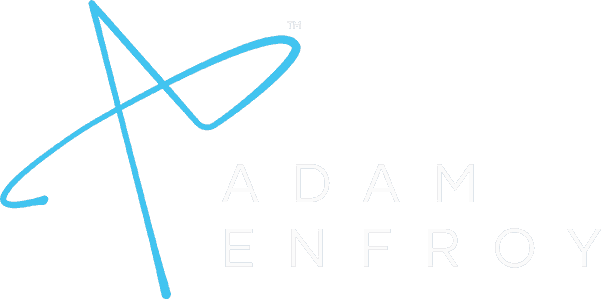Podbean vs Libsyn vs Buzzsprout: Which is Best in 2024?
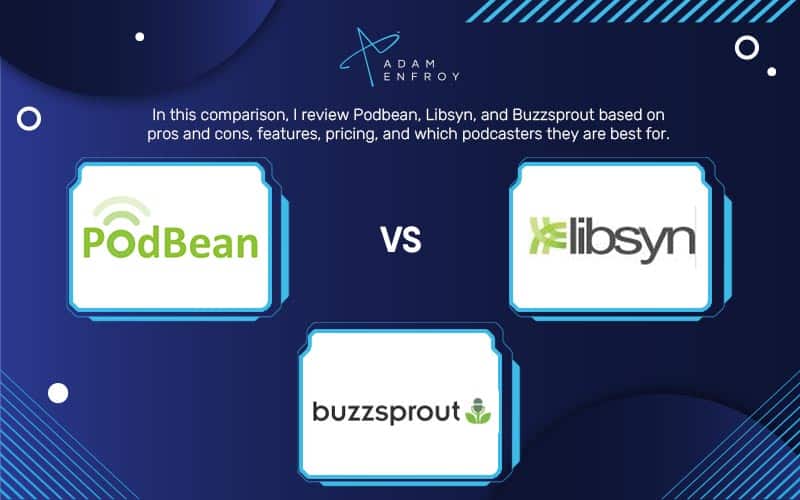
In this review, I’ll be comparing three major podcasting hosting platforms – Podbean, Libsyn, and Buzzsprout. I’ll cover their pros and cons of each, key features, and which tool you should choose based on your preferences.
Podbean vs Libsyn vs Buzzsprout: Overview.
Podbean:
Podbean is a podcast publishing and monetization platform with free, paid, and premium hosting packages. It incorporates publishing, management, syndication, and analysis tools into an easy-to-use podcasting package. It also has apps for iPhones and Android devices.
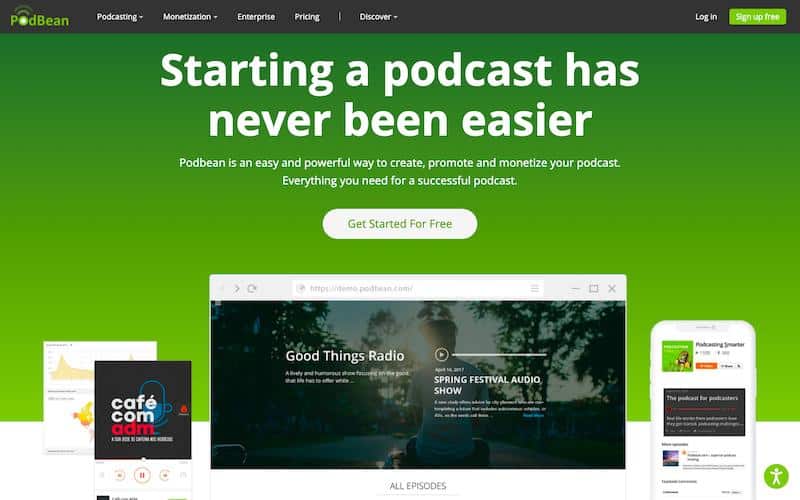
Here are some of Podbean’s key features:
- Easy and Scheduled Publishing – There is no learning curve for any person with Podbean. You can use the intuitive user interface to publish a podcast with a few clicks. You can also schedule your podcasts in advance.
- Unlimited Hosting – There are no limits on downloads, episodes, or recording time.
- Professional Website – You will get a website builder and other tools to create a free podcast site to host your show. You can choose from a variety of customizable professional podcast site themes as well.
- Custom Domain Integration – The platform allows you to use your own branded domain for your site.
- Mobile Podcast Publishing – You can use your phone to schedule and publish podcast episodes.
- Distribution & Promotion – Podbean helps you get your podcast in front of potential listeners and expand your audience. You can distribute your podcasts to Apple Podcasts, Google Podcasts, Spotify, and Podbean’s own podcast apps.
- Podcast Statistics – Podbean’s comprehensive statistics will give you all the insights into how your podcast performs.
- Monetization – Podbean provides three monetization options, namely Podcast Advertising, Premium Content, and Patron.
- Live Streaming – You can expand your podcast with live audio shows while engaging your audience by sending them instant messages and calling them into your live shows.
- Podbean Podcast App – The Podbean podcast app is available on iOS and Android devices and lets you record, edit and publish podcast episodes from your phone.
Libsyn:
Libsyn stands for Liberated Syndication and allows you to deliver, host, and track the kind of podcast show you want. This hosting service can simplify workflows, boost content delivery, and engage podcasters and their communities everywhere. Currently, it hosts over 75,000 podcasts worldwide.
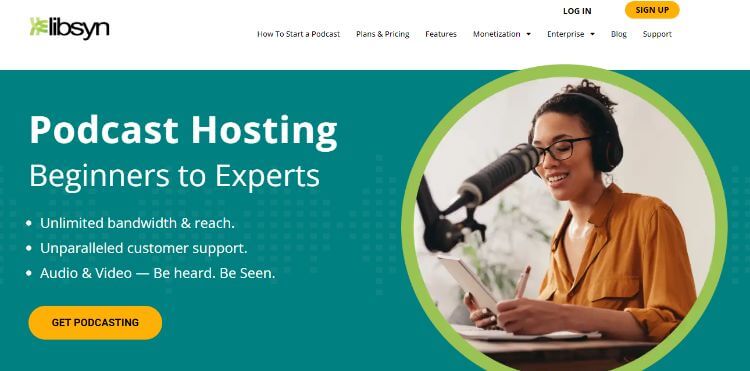
Here are some of Libsyn’s key features:
- IAB v2.0 Certified Podcast Statistics – Libsyn provides in-depth audience analytics and AB v2.0 certified stats. IAB v2.0 compliant stats also help your potential investors, show sponsors, and advertisers value and trust you as a podcast host more.
- Custom Episode Publishing And Optimization – This feature includes Apple podcasts optimization, easy publishing plugin integration for WordPress website users, 100% compliant RSS feeds with major podcasts consumption platforms, etc.
- Custom HTML5 Media Player – Reach your mobile audience with an audio or video media player customized to align with your show and brand.
- Podcast Page Mini-Site – You can use Libsyn’s mini sites if you don’t have your podcast site yet. These sites are the branded mobile compatible listening destination.
- Smartphone App – Customized mobile apps available for iOS or Android devices.
- Custom Domain – Add a layer of branding to your show and page with the custom domain.
- Color Swatches – Customize your podcast player and page with your brand’s colors to keep your branding consistent.
- Advertising and Monetization Tools – You get access to advertising and monetization options like Hand-Picked Ad Slots, Ad Stitching, and Targeting.
Buzzsprout:
Buzzsprout is a podcast hosting platform that helps you host, promote, monetize, and track your podcast shows. The platform is suitable for any podcast host from beginner to expert and provides features like RSS feed management, a free podcast site, custom embed players, etc.
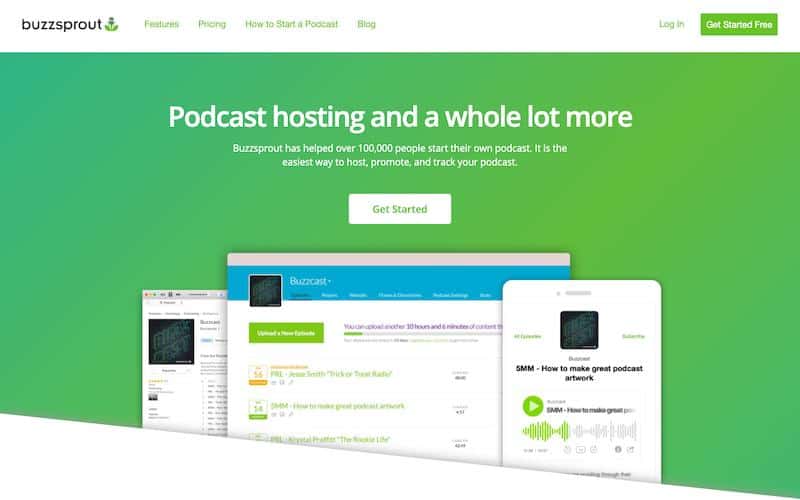
Here’s a list of Buzzsprout’s key features:
- Podcast Distribution – List your podcasts in Apple Podcasts, Spotify, Google Podcasts, and more and reach millions of potential listeners.
- Advanced Statistics – Get stats like total downloads, which apps listeners are using to listen to your podcast, what podcast directories they’re using the most, etc.
- Free Podcast Hosting Service For 90 Days – Buzzsprout podcasting is free for the first three months.
- Magic Mastering – Magic Mastering helps you automatically enhance audio files and optimize them to match best practices for the spoken word.
- Automatic Episode Optimization – Buzzsprout can automatically optimize any type of files, bitrates, or ID3 tags. You can publish your episode immediately or make scheduled posts.
- Dynamic Content – The platform’s Dynamic Content tool allows you to add and remove intros and outros segments to and from your podcast show episodes.
- Transcriptions – Buzzsprout allows you to transcribe your podcast show for search engine optimization, speed-readers, and the hearing impaired.
- Podcast Player – Buzzsprout allows you to add a customizable podcast player to your website with just a snippet of code. You can use it to control and share your episode on social media.
- Monetization – Generate income from your podcast using Buzzsprout’s affiliate marketplace.
- Chapter Markers – Chapter markers let fans navigate to their favorite segments, know what’s coming up, or skip spoilers.
- Multiple Podcasts with Unlimited Team Members – Make unlimited podcasts under one account and add as many members as you want to manage your podcast.
- Visual Soundbites – This feature lets you create short video trailers for your podcasts to promote them on social media.
- Get Updates – You’ll get updated every time you hit an important milestone.
- Custom Website – It lets you create a website to host your podcasts with your own domain.
Point by Point Comparison.
Let’s start with a step-by-step comparison of Podbean vs Libsyn vs Buzzsprout:
- Podcast Website Creation
- Statistics and Analytics
- Advertising and Monetization Options
- Podcast Distribution and Promotion
- Embeddable Podcast Player
- Third-Party Integrations
- Mobile App
- Customer Support
- Pricing Plans
1. Podcast Website Creation.
Creating a podcast site is essential if you don’t have an existing website of your own. Podbean, Libsyn, and Buzzsprout all provide this feature with all of their plans.
Podbean:
Podbean lets you create a website pretty quickly with various pre-designed website themes, both paid and free.
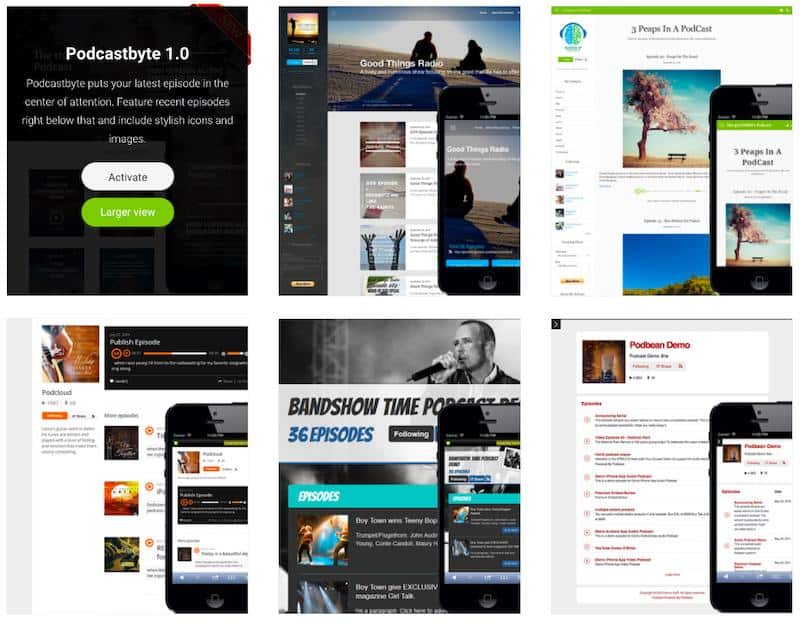
You can pick a theme that aligns the most with your podcast’s niche and goals. There are also options to customize elements like your header image, fonts, background colors, background image, style, subdomain, etc.
The paid plans also provide advanced customization options and a custom domain. You can quickly preview your site before publishing it to get an idea of how the final product looks.
Libsyn:
Libsyn comes with Podcast Page “Mini Sites” that work as a place you can send your visitors to access your podcasts. The page will consist of your podcast episodes, quick episode summary, text posts, HTML5 media player, social media widgets, etc.
Here’s what your final Podcast Site would look like:
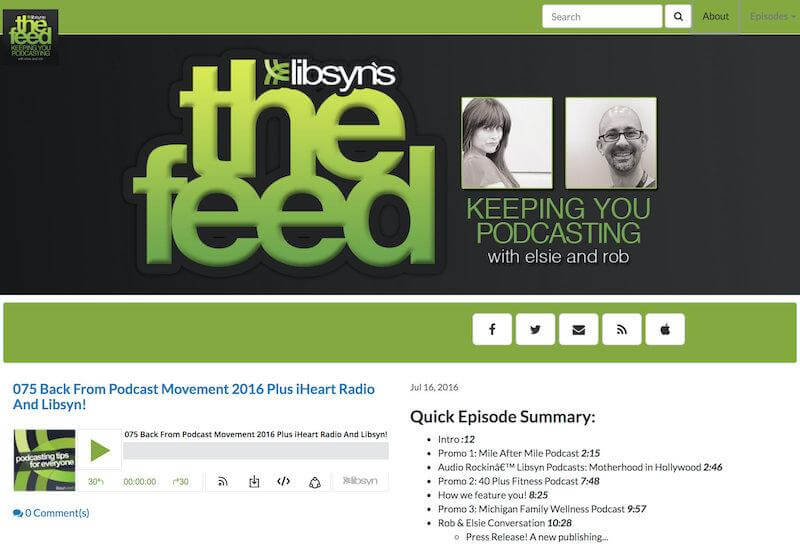
You can customize it to match your podcast’s branding by editing elements like your header, theme colors, title font color, etc.
Buzzsprout:
Buzzsprout also lets you create a simple site to host your podcast, along with a custom domain and social sharing options. There are also preview options for both desktop and mobile sites.
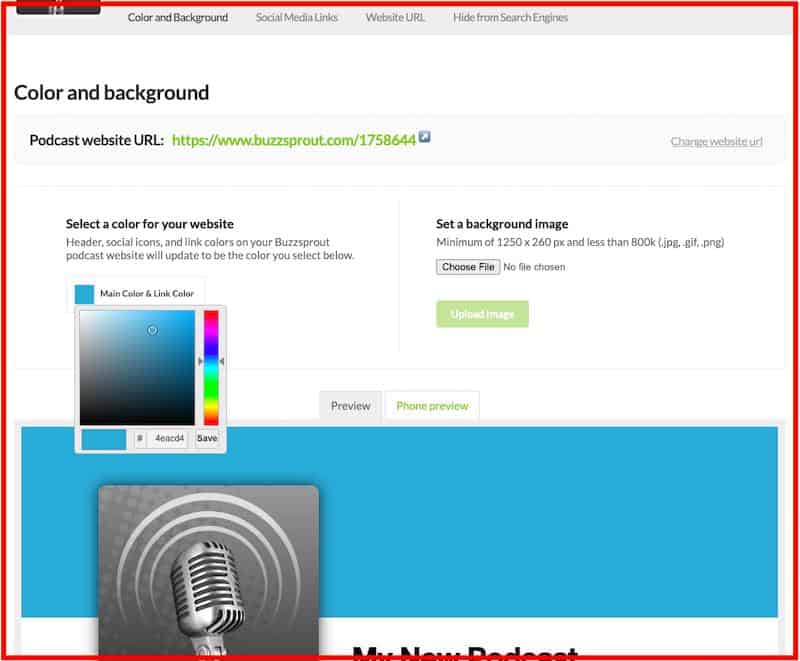
You can change the site’s color and background image for personalized branding. Although there aren’t many customization options or even website templates, you do get easy-to-navigate default pages.
Winner: Podbean.
Podbean is the clear winner here for podcast creators who want a custom site due to its numerous themes for websites, custom domain, and versatile customization options.
2. Embeddable Podcast Player.
If you already have a podcast site, you can simply embed the podcast player on your site. The embeddable player is also convenient for sharing your content on podcast directories and apps.
Podbean:
Podbean’s embeddable player is simple without any bells and whistles and showcases your podcast’s header image and title.
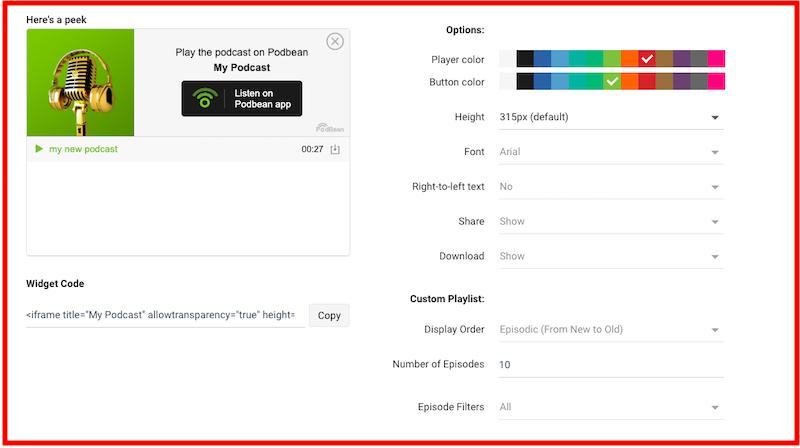
You can embed it on your website or blog page using a widget code. There are several customization options to match your brand’s theme, including player color, height, font, etc.
Libsyn:
Libsyn has a mobile-friendly custom HTML5 media player that helps you display all episodes or just a single episode. Besides audio, it can also distribute PDFs and videos via your RSS feed.
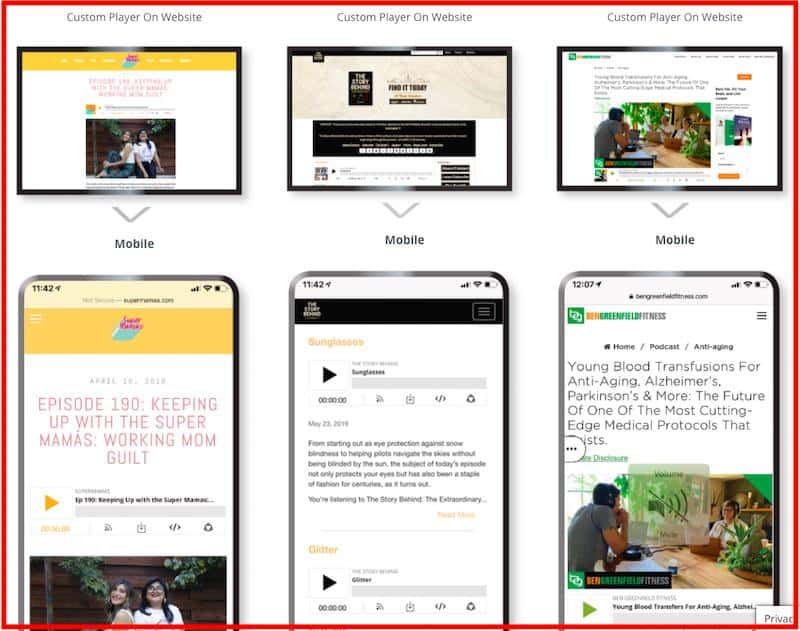
There are plenty of customization options, including custom sizes, thumbnail settings, custom start time, playback direction, and custom colors.
Buzzsprout:
Buzzsprout also has a built-in player generator to embed podcasts on your website. You can customize colors and fully control listening.
The podcasting platform lets you choose from two player options:
- Separate player for each episode.
- Multiple episodes in one player.
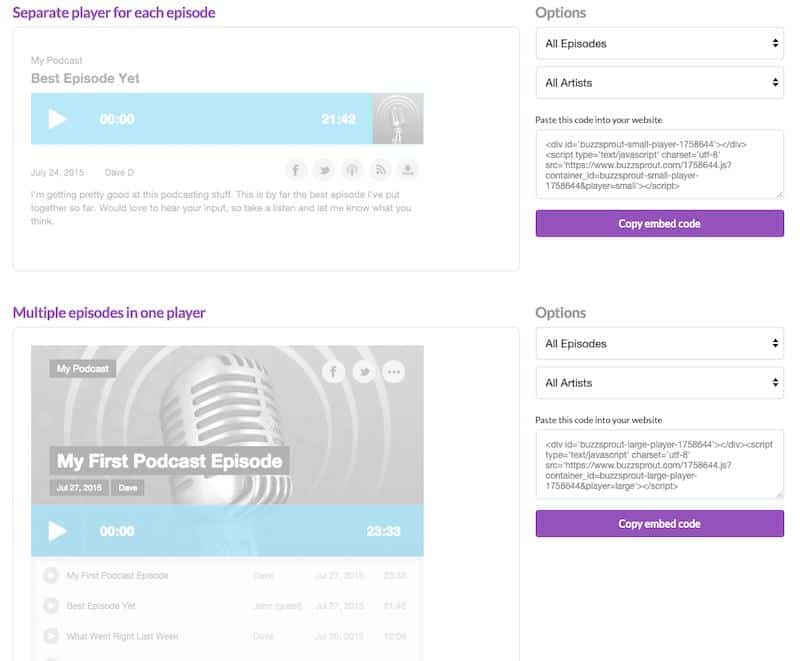
You just have to paste the code provided on the rightmost side into your site side to embed and use the player.
Winner: Libsyn.
Libsyn is the winner here due to more customization options and the ability to embed videos and PDFs.
3. Statistics and Analytics.
Statistics and analytics help you determine how your podcasts are performing and whether your efforts are paying off or not.
Podbean:
Podbean provides comprehensive statistics and complete insight into your podcast performance, including downloads, trends, listener geographies, and more.
You can also view a complete overview of your podcast and user interaction based on your follower count, comments, and likes.
Here are all of the statistics you can track with Podbean:
- Top 10 episodes for various date ranges.
- Listener geographies to tell you where your audiences are listening from.
- Total downloads by the time of day.
- Unique user retention data.
- User agents chart to tell you which devices and apps your audiences use to listen to your podcast.

You can even add User Engagement intel to understand why your episodes are or are not working. However, you must have one of the paid plans to access advanced statistics and user engagement intel.
Libsyn:
Libsyn provides IAB v2.0 certified podcast statistics and audience insights. The IAB standards include following filters and measurement practices for better clarity.
The platform lets you measure user agent stats, global popularity, audience concentration, destination stats, social media stats, total downloads, etc.
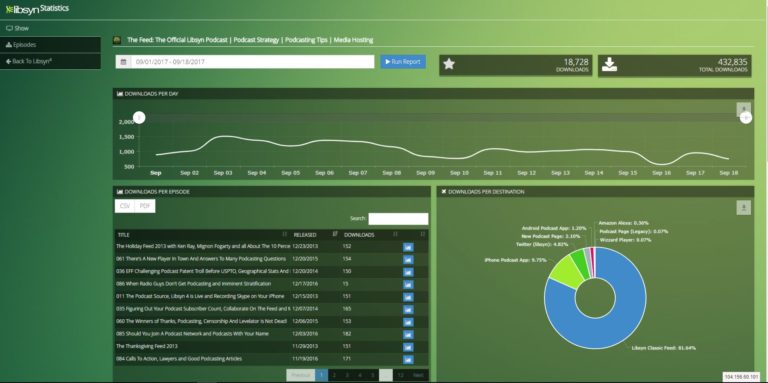
Here’s everything you can measure with Libsyn:
- User agent stats tell you which platform delivers the most downloads and where your audience goes for your podcast.
- Geographic Heat Map that lets you identify global popularity and audience concentration.
- Destination stats to give you an idea about download breakouts of destinations.
- Social media stats.
- Day, week, and month download stats.
- Data range selector to review specific historic date ranges and downloads.
- Episode stats and breakdowns to get the detailed geographic, destination, and user-agent statistics specific to each episode you publish.
There’s also an option to export these trends and analytics using downloadable stats reporting. However, you have to purchase the Libsyn Advanced 400 + plans or higher to access Libsyn’s advanced analytics and reporting feature.
Buzzsprout:
Buzzsprout’s dashboard also provides access to metrics like your total downloads over time, listener statistics, most popular podcast directories, and more.
The dashboard layout is user-friendly, making it easier for even a beginner to analyze the data.
Here’s everything you can measure with Buzzsprout:
- The total number of listeners for each episode during the first 90-days.
- What apps audiences are using to listen to your podcasts.
- From which geographic location are they listening to your podcasts?
- Total episode downloads.
- Podcast overview.
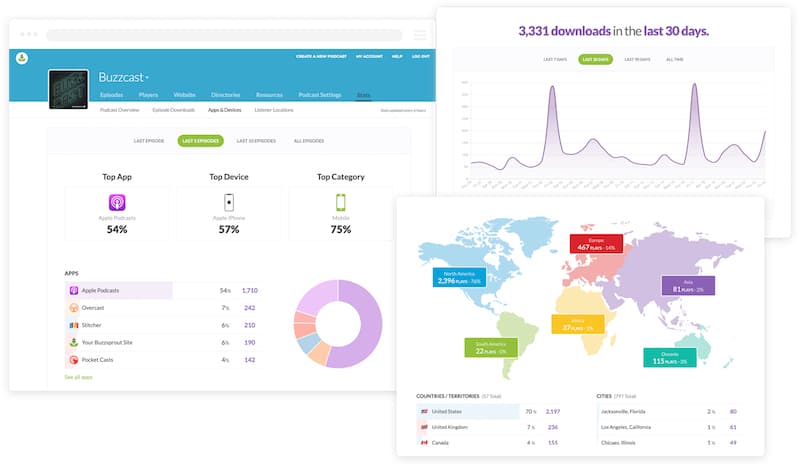
You’ll also find a podcast predictor in your dashboard that forecasts how many downloads to expect for your next episode.

Winner: Buzzsprout.
Though all of them provide similar insights, Buzzsprout wins here since it offers advanced statistics with all of its plans. I also liked the way Podbean laid out all of the statistics and data on its dashboard. It’s very visual, which makes it easy to analyze everything.
4. Advertising and Monetization Options.
Podbean:
Podbean’s monetization and advertising methods include:
- Podcast Advertising – It allows you to list your podcast in the Podbean advertising marketplace for free to get matched with potential advertisers.
- Premium Podcast Service – You can get paid for podcast content with multiple subscription tiers or single-episode sales.
- Patron – You can create a “Patron Page” for your podcast and allow fans to support your content with recurring, monthly donations.
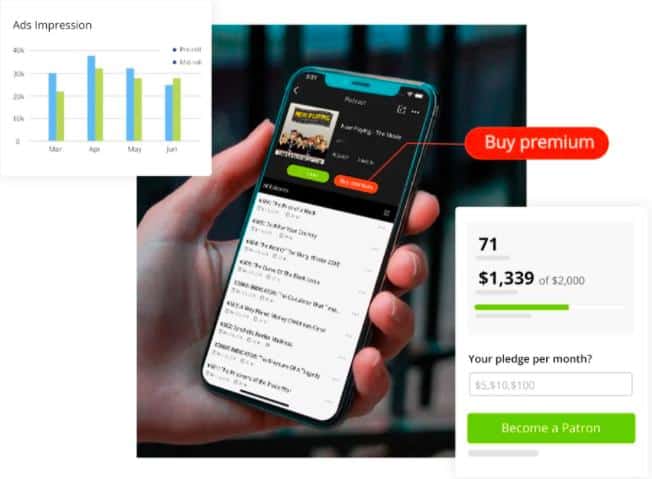
You can track your revenue and ads impression within the dashboard. All of these monetization options are also built-in with your dashboard. However, you need to purchase advanced plans to utilize all of these monetization options.
Additionally, you can live-stream your events and make money by selling virtual tickets for your live events. Listeners can even send you virtual gifts that can get converted to US dollars, allowing you to retrieve the money.
Libsyn:
Libsyn allows you to sell ad slots if your show gets at least 5,000 U.S. downloads within 30 days of release. You’ll also have to fill out the W-9 form for tax purposes.
Libsyn provides two monetization and advertising options:
- Live Read Advertisements – You can read reviews or testimonials in real-time during your podcast episode.
- Stitched Advertisements – Play an audio commercial during your podcast to advertise a product.
The revenue share is a 50/50 split on the ad campaign payout.
Libsyn also has ad stitching tools that include ads in your files specifically targeting specific geographic locations. You can also sell subscriptions to your content to monetize audio and video content, pdfs, and bonus episodes.
Buzzsprout:
Buzzsprout offers podcasters access to an affiliate marketplace to monetize their podcast. It helps you match and collaborate with affiliate programs like Allswell, Buzzsprout, Instacart, etc.
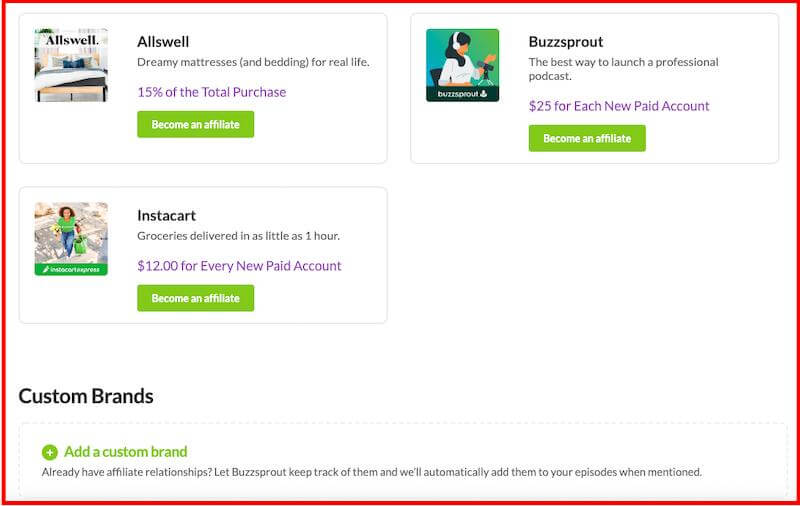
The tool will automatically add the affiliate link into your podcast episode’s notes once you become an affiliate. With Buzzsprout’s affiliate program, you get 15% of the total purchase, and your listeners get 20% off of the first order and free shipping on orders over $50.
Buzzsprout also partners with Podcorn to help you find suitable brand sponsorships for your podcast.
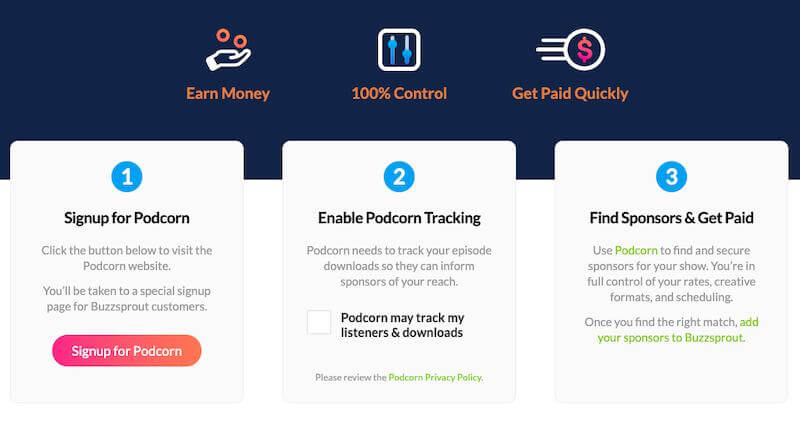
You’ll also be able to manage unlimited podcasts under one account and provide account access to unlimited team members.
Winner: Podbean.
Podbean provides more diverse monetization options, followed by Libsyn and Buzzsprout.
5. Podcast Distribution and Promotion Features.
Podbean:
Podbean allows you to submit your podcast to the most well-known podcast directories, including Apple Podcasts, Google Podcasts, Spotify, Amazon Music, etc. Other options include Pandora, TuneIn + Alexa, iHeartRadio, PlayerFM, Listen Notes, Stitcher, Podcast Addict, and Deezer.
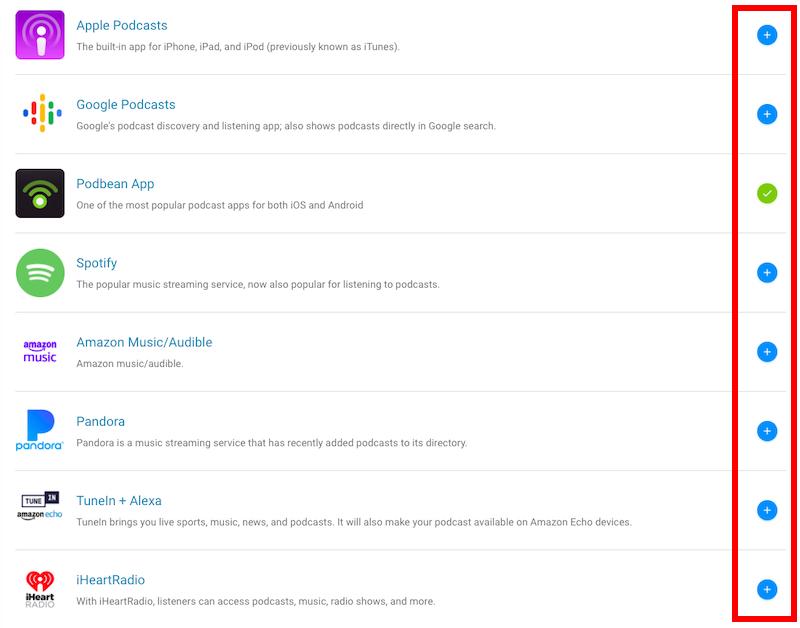
You simply have to copy + paste your RSS feed URL to submit your files to these apps.
Plus, submitting your podcast episodes on Apple Podcasts automatically makes them available on directories like Overcast, Pocket Cast, Castro, and Castbox.
There’s also an “Alexa Skill” feature that automatically makes all new podcast episodes available on Alexa devices. Your podcasts are also instantly available in Podbean apps for iOS and Android.
Podbean also provides a social media auto-sharing feature that automatically shares your new podcast shows on connected social media channels. It lets you share your content on Facebook, Twitter, LinkedIn, YouTube, Tumblr, and WordPress.
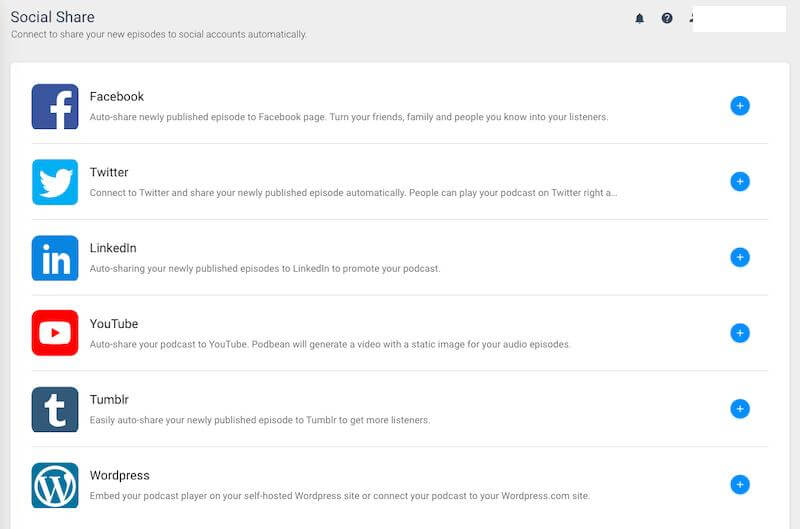
Additionally, its advertising management solution lets you focus on producing your podcast by inserting your ads automatically.
Libsyn:
Libsyn allows you to distribute and host not just audios but also PDFs and videos. You can submit your podcasts to directories like Spotify, Apple Podcasts, Google podcasts, Deezer, Soundcloud, TuneIn, and more.
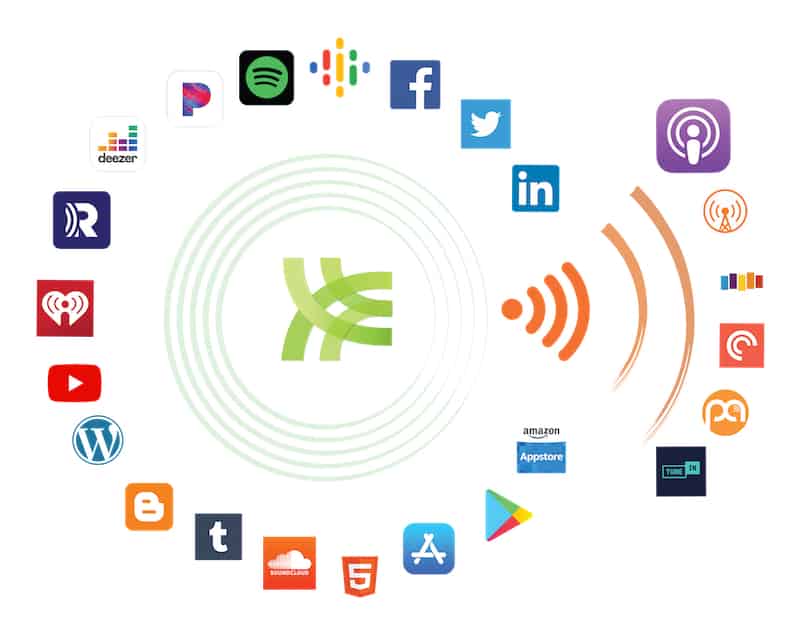
Social media sharing options include Facebook, LinkedIn, Twitter, YouTube, and more.
You can use built-in bulk editing tools to add or remove content from any destination you want.
Other distribution features include:
- The ability to control where and when you publish.
- Apple podcasts optimization.
- 100% compliant RSS feed.
- FTP upload support.
- Automatic submission to the Libsyn directory.
- Integrated publishing to over 20 podcast platforms.
Buzzsprout:
Buzzsprout allows you to submit your podcasts to the following directories:
- Apple Podcasts
- Spotify
- Google Podcasts
- Amazon Music
- Stitcher
- iHeart Radio
- Pandora
- TuneIn + Alexa
- Podcast Addict
- Podchaser
- Pocket Casts
- Deezer
- Listen Notes
- Player FM
- Podcast Index
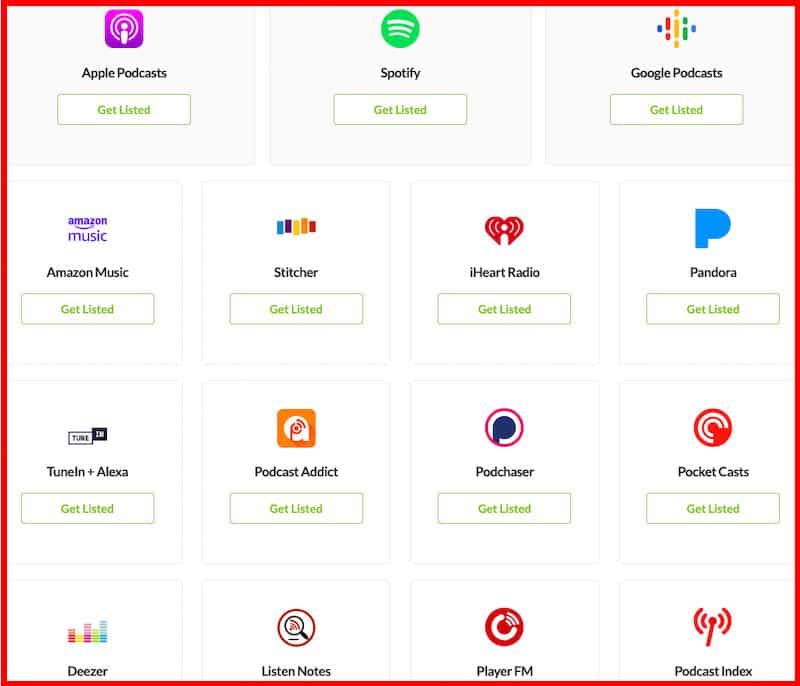
Once listed in Apple Podcasts, your podcasts will automatically appear on podcasting apps like Overcast, Castro, Catbox, Podfried. You can also share your podcasts on social channels like Facebook, Instagram, Twitter, and LinkedIn to find new listeners.
Other than this, Buzzsprout offers several other advanced promotion and marketing tools to reach a wider audience. For instance, its “Visual Soundbites” function lets you create a video trailer based on a short length of your podcast’s audio.
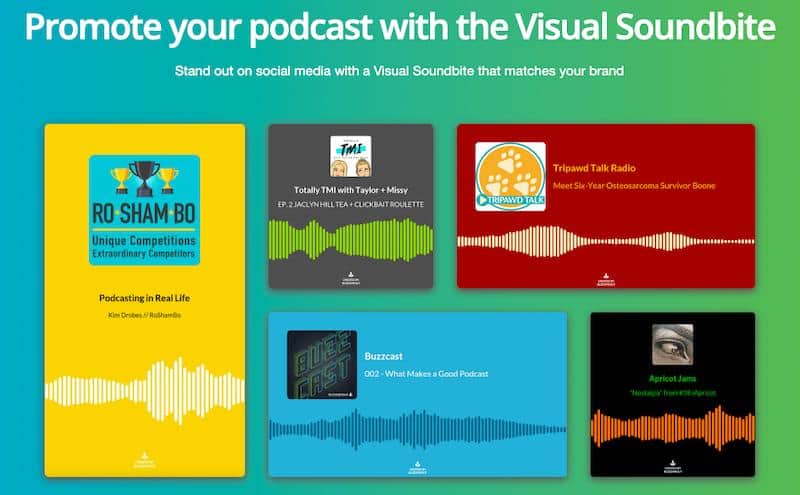
Other advanced features include:
- Chapter Markers – This feature lets you divide your longer episodes into shorter “Chapters” or segments. Your audiences can easily navigate to a specific segment or skip spoilers.
- Magic Mastering – Just like Instagram filters enhance your image quality, magic mastering functionality helps you enhance your audio quality.
- Automatic Episode Optimization – Buzzsprout optimizes your episodes automatically as soon as you upload them. You can publish them immediately or schedule the day and time.
- Transcription – Buzzsprout helps you make your podcasts more accessible by transcribing them. It’s more convenient for SEO, speed-readers, and the hearing impaired.
Winner: Buzzsprout.
Buzzsprout offers far more advanced promotion and distribution features than Podbean and Libsyn. Although, many podcasters may find Libsyn’s bulk editing tool pretty useful too.
6. Third-Party Integrations.
Podbean:
Podbean allows both free and paid integrations. For instance, you can automatically send emails to your Mailchimp subscribers when you publish new episodes for free. Integration with Mailchimp also helps you gather email addresses.
It also integrates with free tools like Dropbox, Vokal Studio, Google Analytics, SEO Meta Tags, Article Amplifier, and more.
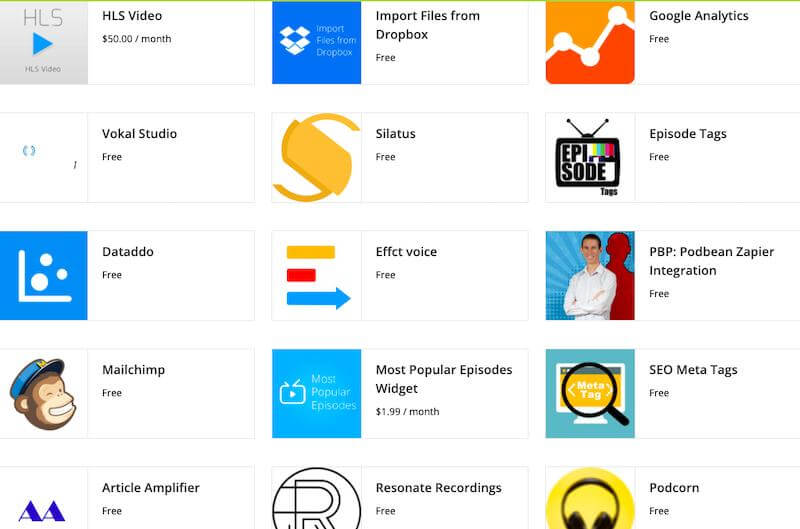
Libsyn:
Libsyn allows direct integration with WordPress with its plugin WordPress Libsyn Publisher Hub. The plugin lets you publish podcasts directly from WordPress and ensures that files and RSS feed gets hosted off your web browser server.
Plus, Libsyn’s OnPublish Integrated Publishing feature allows publishing to more than 20 podcast platforms from one dashboard. Libsyn RSS feed and OnPublish also connect you to your audience on platforms and apps like Spotify, Pandora, Apple Podcasts, etc.
Buzzsprout:
Buzzsprout offers a paid integrated audio transcription feature that starts at $0.25 per minute. It’s great for SEO, converting audio episodes to blog posts, or reaching new audiences.
You’ll also get a free WordPress podcast plugin that you can embed with your podcast player or site. The platform also integrates with podcast tools like Chartable, Alitu, Podtrac, and Hindenburg Journalist.
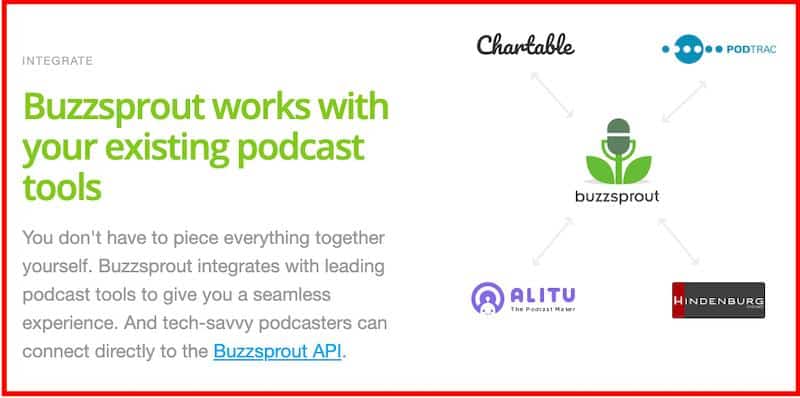
You can connect directly to the Buzzsprout API for more advanced integration options.
Winner: Podbean.
The clear winner here is Podbean with its native plugin options.
7. Mobile App.
Podbean:
Podbean provides an app for iOS and Android devices that lets you live stream your podcasts or record and edit your podcasts, then publish them. The Podbean Podcast app has over a million active users and several built-in tools to enhance your podcasting experience.
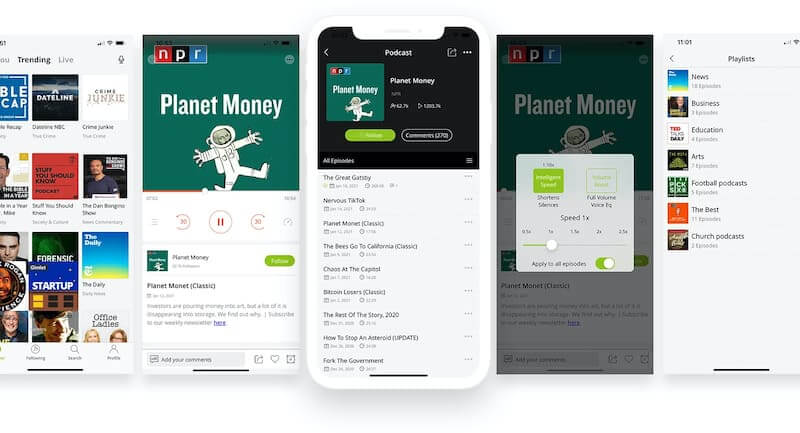
Podbean’s mobile app allows you to:
- Discover new content to match your interests and download it anywhere, anytime.
- Live stream events.
- Engage your fans by leaving comments.
- View your followers and follow other podcasters.
- Access your performance data.
- Remove silences from an episode using the Intelligent speed feature.
- Use the volume boost feature to normalize the volume.
- Add background music and sound effects.
- Edit, split, merge, and export podcast files.
The mobile app also helps you deliver your bonus episodes and patron-only content to premium users. It also provides free storage space, promotional opportunities, and social sharing tools.
Listeners also get features like auto-update, new episode notifications, customized playlists, and recommendations.
Libsyn:
Libsyn has its own custom iOS and Android apps and are available in Google Play and Amazon markets.
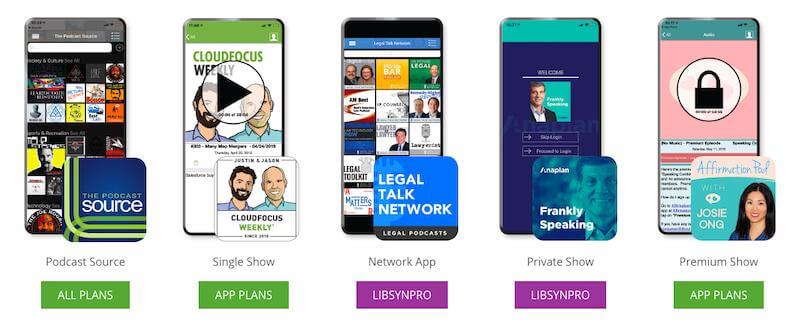
It allows users to create lists of their favorite episodes. You can also use custom colors and graphics to match it with your brand’s theme.
Other features include:
- Social media integration and shares.
- Sleep timer.
- Speed settings.
- Commenting and voicemail lines.
- Compatible with audio, video, text, and pdfs.
Buzzsprout:
For Buzzsprout, the site functions as a mobile App on your listener’s end. They can access it via Add to Home Screen feature on iOS and Android devices.
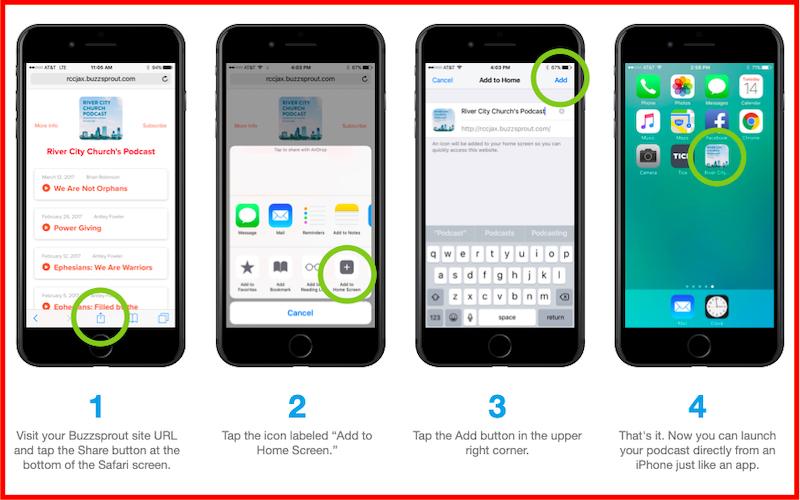
Winner: Podbean.
Podbean wins in the app category since the Podbean Podcast app has more advanced features for users and podcast hosts.
8. Customer Support.
Podbean:
Podbean provides podcasters with customer support via email ticketing and a live chat option. There’s no phone call option.
It also offers extensive support through its knowledge base. The knowledge base contains video tutorials, “get started” guides, ad support, Live stream guide, app guide, free webinars, developer guide, plugin support, and other resources for podcasters.
Libsyn:
Libsyn has a support blog, community blog, video tutorials, and a knowledge base. You will also find several guides like how to start and plan your podcast.
Their email support staff is available to help Monday through Friday, 9 am – 5 pm. Libsyn system status also lets you report system failures, free monthly Podcasting Quick-Start Webinar, and legal help.
Buzzsprout:
Buzzsprout support includes detailed guides on how to start a podcast, blog, platform stats, WordPress plugin guide, Buzzsprout API guide, etc.
The helpdesk also consists of queries and FAQs on topics like embedding, WordPress plugin, directories, and other podcasting features. You can also leverage the search option to browse anything you want.
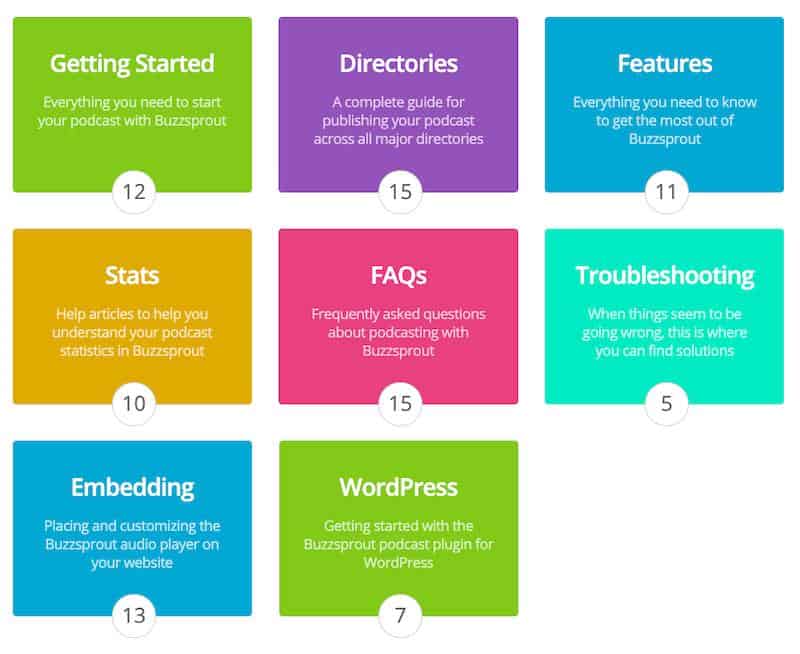
There’s also a Press Kit where you’ll find valuable assets, including the Buzzsprout logos, colors, app screenshots, and more. They also have a YouTube channel and a private Facebook community.
For direct support, you can get in touch with their team via email support. There’s no phone call or live chat option.
Winner: Podbean.
Podbean is the winner here since it offers a live chat option, email ticketing, and self-help guides. The other two podcasting platforms only let you connect with them directly via email support.
9. Pricing Plans.
Podbean:
Initially, you get a freemium plan that gives five hours of total storage, 100GB bandwidth, and some limited services and functions. There are three paid plans after that.
Podbean’s paid plans include:
- Unlimited Audio – $9 per month (billed annually)
- Unlimited Plus – $29 per month (billed annually)
- Business – $99 per month (billed annually)
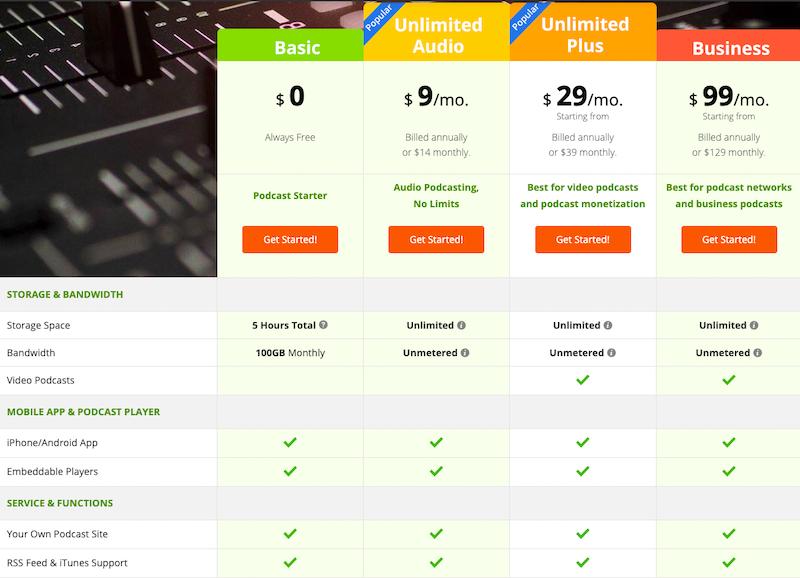
All of these plans provide unlimited storage space, unmetered bandwidth, advanced statistics, Pro themes, RSS feeds, and more. There are some variations in their customization options and features. For instance, you’ll get the Patron account feature only with the Unlimited Plus and Business plan.
Libsyn:
Libsyn doesn’t offer a free plan. You get six payment plans, starting price from $5 per month.
The paid plans include:
- Classic 50 – $5 per month (up to 50MB storage)
- Classic 250 – $15 per month (up to 250MB storage)
- Classic 400 – $20 per month (up to 400MB storage)
- Classic 800 – $40 per month (up to 800MB storage)
You can opt for advanced plans for more storage:
- Advanced 1500 – $75 per month (up to 1500MB storage)
- Advanced 3000 – $150 per month (up to 3000MB storage)
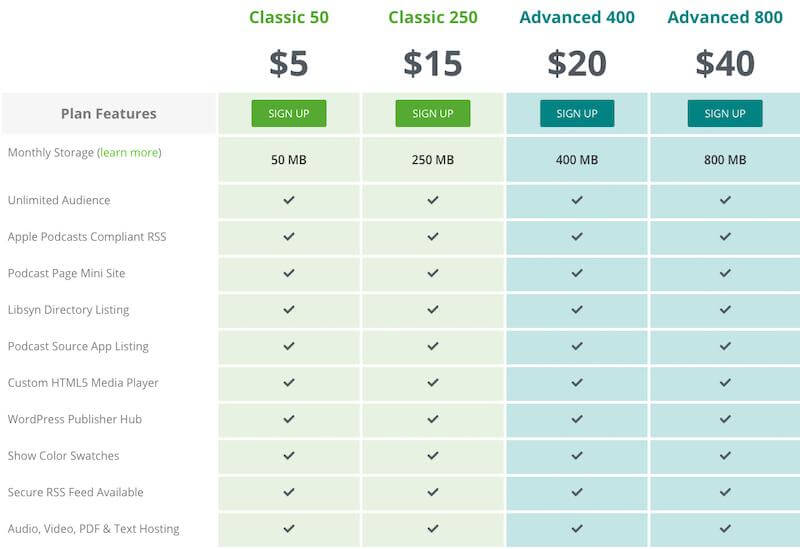
You can try LibsynPRO for more features, storage, and custom pricing. Some of its features include dynamic ad insertion tools, SSO Private Podcasting, IAB v2.0 compliant stats, and more.
Buzzsprout:
Buzzsprout provides one freemium plan for up to 90 days and three paid plans.
The paid plans cost:
- $12 per month
- $18 per month
- $24 per month.
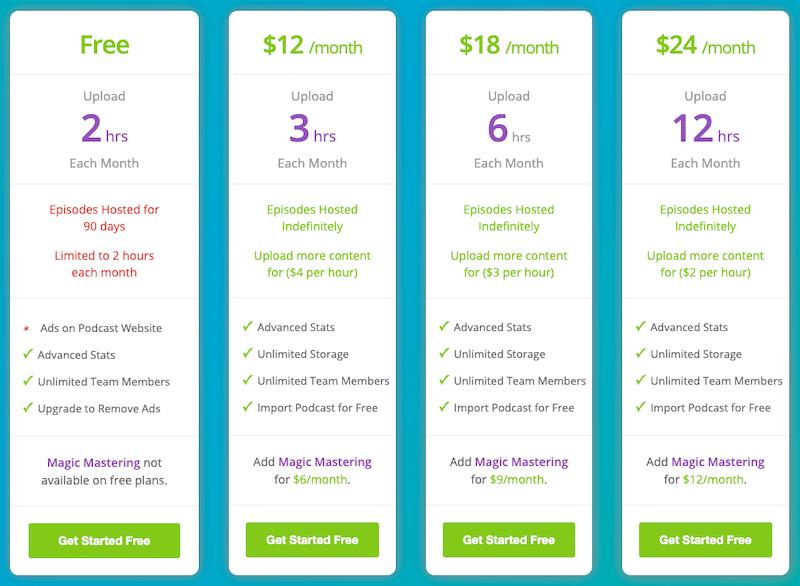
The free plan lets you upload two hours of audio each month, making it a great choice for beginners or those creating infrequent and short episodes.
The first paid plan allows three hours of audio, the second allows six hours of audio, and the third allows 12 hours of upload monthly. You can also upload more content by paying an extra amount per hour for each plan.
All of the paid plans provide full access to statistics, embedded players, podcast directories, and a podcast site.
Winner: Podbean.
Podbean is the winner here since it provides an unlimited free plan that allows five hours of audio upload each month. However, you’ll have to make the final decision based on your requirements and business goals.
Overall Pros and Cons.
Podbean, Libsyn, and Buzzsprout all three provide extensive features to create, distribute, and monetize podcasts. Nonetheless, they all have their specific pros and cons.
Here’s a quick breakdown of the pros and cons of all of these podcast tools.
Podbean Pros and Cons:
Pros:
- The platform is beginner-friendly.
- Pre-designed themes for websites.
- Embeddable audio player with numerous customization options.
- Comprehensive and visual statistics dashboard.
- Live streaming options.
- Unlimited hosting with all of its plans.
- Automatic social-sharing option.
- Integration with multiple third-party apps, including Mailchimp.
- Podbean Podcast app has advanced features for both podcasters and listeners.
- Integration with all major podcast directories, including iTunes or Google Play.
- A generous free plan, allowing you to use their main features without any investment.
- Built-in and versatile monetization options.
- Customer support via email and live chat.
Cons:
- You can’t do video podcasting with the starter plans.
- You get only a 7-day refund period.
- There’s no backup feature.
Libsyn Pros and Cons:
Pros:
- Bulk editing tool.
- The ability to control where and when you publish.
- Automatic Apple podcasts optimization.
- 100% compliant RSS feed.
- Support to upload File transfer protocol (FTP) files.
- Automatic podcast submission to the Libsyn app directory.
- Integration with over 20 prominent podcast platforms.
- The ability to sell an advertisement spot on your podcast.
- Libsyn supports video, audio, and PDFs.
- It’s comparatively cheap, with the base plan price starting at $5/month.
- Libsyn connects with a wide range of podcast directories, apps, and services, including Apple Podcasts.
- It’s straightforward and easy to upload your content onto a readable RSS feed.
Cons:
- The platform is not the easiest to use.
- It doesn’t offer a free trial.
- No live chat or phone call support.
- You need to pay for the analytics feature.
- Though considered affordable, Libsyn’s cheapest plan gives you only 50MB of audio a month.
Buzzsprout Pros and Cons:
Pros:
- The free basic plan allows you to create two hours of audio each month.
- A wide range of podcast directories, including Apple Podcasts, Spotify, Google Podcasts, Pandora, etc.
- Access to an affiliate marketplace and sponsors to monetize your podcast.
- The audio transcription feature allows more access to search engines, speed-readers, and the hearing impaired.
- API integrations to connect with third-party apps.
- Simple payment plans.
- Automatic podcast optimization, making it especially suitable for beginners.
- Dynamic content tool to remove and add outros or intros.
- Chapter markers for quick navigation.
- Host multiple podcasts with unlimited team members.
- Magic Mastering to enhance your audio quality.
- Visual Soundbite feature to create a video trailer for your podcast.
Cons:
- The free plan ends in 90 days.
- No live chat or phone call support.
- Limited monetization options.
Executive Summary.
Podbean, Buzzsprout, and Libsyn are some of the best podcast hosting platforms. The pricing and features vary slightly, but all three platforms allow you to manage every aspect of your podcast and create a podcast hosting site.
Try Podbean if you want unlimited storage and hosting services at an affordable price. Their $9 per month Unlimited Audio Plan is an excellent option if you only have one podcast. You can get the Unlimited Plus and Business plans if you want to monetize your podcasts.
Buzzsprout is most suitable for beginners with its automatic episode optimization feature and advanced podcast promotion features. Their free plan is great, and Buzzsprout’s publishing interface provides ease of use.
Finally, Libsyn’s advanced business features are most suitable if you have existing podcasts and know how much storage is required. It’s best for professionals and businesses. Libsyn’s basic plans are worth considering too.
Which one of these podcast hosting companies and platforms are you planning to use, and why? Let me know by commenting below.
Last Updated on May 13, 2024 by Adam Enfroy
